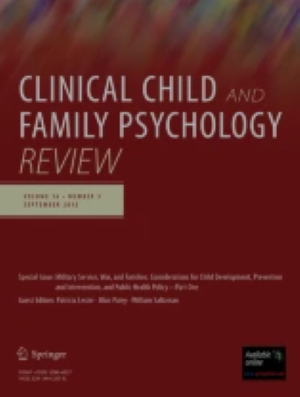Perinatal Mental Health Interventions with a Parent-Child Relational Component: A Systematic Review of the Effects on Mothers and Dyads.
IF 6.1
1区 心理学
Q1 PSYCHOLOGY, CLINICAL
引用次数: 0
Abstract
Perinatal mental health challenges are associated with deleterious next-generation outcomes due in part to their impact on early parent-child relationships. Many perinatal interventions for caregivers with mental health difficulties target either parental mental health or parent-child relationships, despite ample evidence that these are related. This systematic review aimed to examine mental health and relational outcomes associated with perinatal interventions targeting caregiver and relational wellbeing. Seven electronic databases were searched to identify studies meeting the following criteria: (a) intervention targets parental mental health and parent-infant relational wellbeing (b) study design includes a comparison group, (c) study reports mental health and observed relational outcomes for all groups, (d) intervention is delivered to perinatal mothers by a professional, and (e) article is written in English. Data were tabulated to facilitate narrative synthesis and risk of bias analysis. Sixteen articles evaluating 13 interventions delivered to 1070 participants were included. Four interventions exhibited improvements in both outcomes, four demonstrated improvements in only one outcome, and five demonstrated improvements in neither. Clinical implications include support for the use of brief group and individual interventions that target mental health outcomes via support for emotion expression and problem-solving, and relational outcomes via in vivo guidance for sensitive parent-child interactions, promotion of reflective functioning, and addressing caregiver perceptions of parent-child relationships. Limitations related to study quality, design heterogeneity, and participant demographic homogeneity demand caution in interpretation of results and there is a need for higher quality research in this area. The review protocol was pre-registered with Prospero (ID: CRD42022380278).具有亲子关系成分的围产期心理健康干预:对母亲和双代影响的系统回顾。
围产期心理健康挑战与有害的下一代结果有关,部分原因是它们对早期亲子关系的影响。许多针对有心理健康困难的照料者的围产期干预措施既针对父母的心理健康,也针对亲子关系,尽管有充分证据表明这些是相关的。本系统综述旨在检查心理健康和相关结果与围产期干预针对照顾者和关系健康。检索了七个电子数据库,以确定符合以下标准的研究:(a)干预目标是父母心理健康和亲子关系健康;(b)研究设计包括一个比较组;(c)研究报告所有组的心理健康和观察到的关系结果;(d)由专业人员向围产期母亲提供干预;(e)文章以英语撰写。数据被制成表格,以方便叙述综合和偏见风险分析。纳入了16篇文章,评估了向1070名参与者提供的13种干预措施。4个干预措施对两种结果都有改善,4个干预措施只对一种结果有改善,5个干预措施对两种结果都没有改善。临床意义包括支持使用简短的团体和个人干预措施,通过支持情绪表达和解决问题来实现心理健康结果,并通过体内指导敏感的亲子互动、促进反思功能和解决照顾者对亲子关系的看法来实现关系结果。与研究质量、设计异质性和参与者人口统计学同质性相关的局限性要求在解释结果时谨慎,并且需要在该领域进行更高质量的研究。审查方案已在Prospero (ID: CRD42022380278)进行预注册。
本文章由计算机程序翻译,如有差异,请以英文原文为准。
求助全文
约1分钟内获得全文
求助全文
来源期刊

Clinical Child and Family Psychology Review
PSYCHOLOGY, CLINICAL-
CiteScore
10.50
自引率
4.30%
发文量
45
期刊介绍:
Editors-in-Chief: Dr. Ronald J. Prinz, University of South Carolina and Dr. Thomas H. Ollendick, Virginia Polytechnic Institute Clinical Child and Family Psychology Review is a quarterly, peer-reviewed journal that provides an international, interdisciplinary forum in which important and new developments in this field are identified and in-depth reviews on current thought and practices are published. The Journal publishes original research reviews, conceptual and theoretical papers, and related work in the broad area of the behavioral sciences that pertains to infants, children, adolescents, and families. Contributions originate from a wide array of disciplines including, but not limited to, psychology (e.g., clinical, community, developmental, family, school), medicine (e.g., family practice, pediatrics, psychiatry), public health, social work, and education. Topical content includes science and application and covers facets of etiology, assessment, description, treatment and intervention, prevention, methodology, and public policy. Submissions are by invitation only and undergo peer review. The Editors, in consultation with the Editorial Board, invite highly qualified experts to contribute original papers on topics of timely interest and significance.
 求助内容:
求助内容: 应助结果提醒方式:
应助结果提醒方式:


